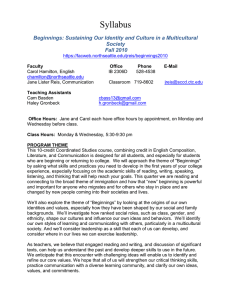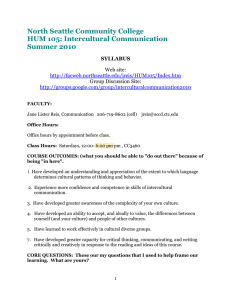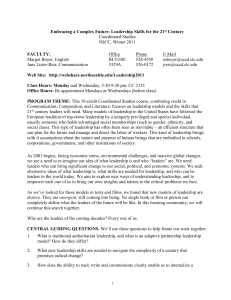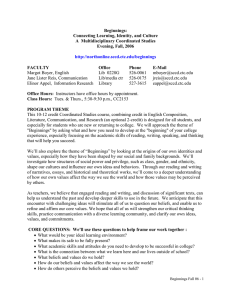Beginnings: Connecting Learning, Identity, and Culture A Multidisciplinary Coordinated Studies
advertisement
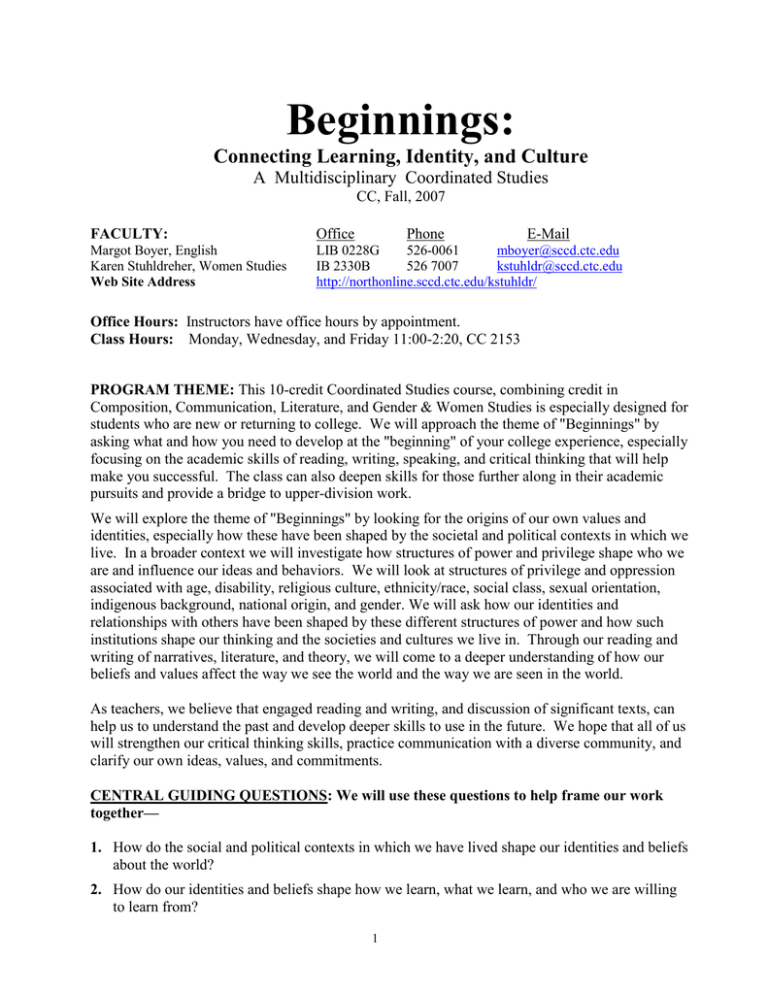
Beginnings: Connecting Learning, Identity, and Culture A Multidisciplinary Coordinated Studies CC, Fall, 2007 FACULTY: Office Margot Boyer, English Karen Stuhldreher, Women Studies Web Site Address LIB 0228G 526-0061 mboyer@sccd.ctc.edu IB 2330B 526 7007 kstuhldr@sccd.ctc.edu http://northonline.sccd.ctc.edu/kstuhldr/ Phone E-Mail Office Hours: Instructors have office hours by appointment. Class Hours: Monday, Wednesday, and Friday 11:00-2:20, CC 2153 PROGRAM THEME: This 10-credit Coordinated Studies course, combining credit in Composition, Communication, Literature, and Gender & Women Studies is especially designed for students who are new or returning to college. We will approach the theme of "Beginnings" by asking what and how you need to develop at the "beginning" of your college experience, especially focusing on the academic skills of reading, writing, speaking, and critical thinking that will help make you successful. The class can also deepen skills for those further along in their academic pursuits and provide a bridge to upper-division work. We will explore the theme of "Beginnings" by looking for the origins of our own values and identities, especially how these have been shaped by the societal and political contexts in which we live. In a broader context we will investigate how structures of power and privilege shape who we are and influence our ideas and behaviors. We will look at structures of privilege and oppression associated with age, disability, religious culture, ethnicity/race, social class, sexual orientation, indigenous background, national origin, and gender. We will ask how our identities and relationships with others have been shaped by these different structures of power and how such institutions shape our thinking and the societies and cultures we live in. Through our reading and writing of narratives, literature, and theory, we will come to a deeper understanding of how our beliefs and values affect the way we see the world and the way we are seen in the world. As teachers, we believe that engaged reading and writing, and discussion of significant texts, can help us to understand the past and develop deeper skills to use in the future. We hope that all of us will strengthen our critical thinking skills, practice communication with a diverse community, and clarify our own ideas, values, and commitments. CENTRAL GUIDING QUESTIONS: We will use these questions to help frame our work together— 1. How do the social and political contexts in which we have lived shape our identities and beliefs about the world? 2. How do our identities and beliefs shape how we learn, what we learn, and who we are willing to learn from? 1 3. Given the identities and beliefs that we each bring to the table, how do we create relationships with people different from ourselves? How do we work with these people to create knowledge and meaning? 4. How do institutions of social power and privilege, such as class, gender and racial inequality, shape our ideas and behaviors? How do they influence our experience of learning? 5. In what ways do reading, writing, and communication about significant texts change our awareness of our identities and the roles we play in society as citizens, students, family members, friends, and workers? How will the work we do in this course help us to clarify our own values, ideas, and commitments? PROGRAM FORMAT: In a coordinated studies program, we emphasize a sense of community where students and faculty learn together. Students are encouraged to cooperate with each other and be responsible for their own and others' learning. You will learn how to read, write about, and discuss important works which can shape your understanding of the past and help you to know the origins of your values and beliefs. In seminars we will discuss a variety of texts, ask questions, identify central themes, and relate these works to the world we live in. We will work in small groups to talk through knotty issues and strengthen writing and critical thinking skills. In small groups we will also examine our personal and cultural assumptions and beliefs in light of the different ideas we encounter in our texts. We will work as individuals to read, write, and think, and as a community to share the fruits of our work together. The faculty team will provide lectures and learning strategies, facilitate the development of your academic skills, and participate as co-learners to help create a democratic and productive learning community. REQUIRED READINGS: Sherman Alexie, Ten Little Indians, 2003 Paulo Freire, Pedagogy of the Oppressed, 1970 Mindy Thompson Fullilove, The House of Joshua, 1999 bell hooks, Teaching to Transgress, 1994 Ursula K. Le Guin, Four Ways to Forgiveness, 1994 Julie Otsuka, When the Emperor Was Divine, 2002 Mike Rose, Lives on the Boundary, 1989 Strunk & White, The Elements of Style, Fourth Edition, 2000 Tim Wise, White Like Me: Reflections on Race from a Privileged Son, 2005 PROGRAM OBJECTIVES: The primary objective of this course is to help you develop a solid foundation in academic knowledge, skills, and attitudes which will aid you throughout your college experience. NSCC has identified some general education goals and specific A.A. Degree requirements which we think are important to work towards. Completion of this Integrated Studies course is important because it will help you to: Discover the interdisciplinary nature of knowledge Integrate sources from multiple fields and viewpoints Work in a collaborative teaching and learning environment Synthesize and evaluate new understandings and knowledge 2 Other General Education (or Liberal Arts) goals will also be emphasized including: In the knowledge area, by the end of the quarter you should Understand some of the major ideas, values, and beliefs that have shaped identities and culture. Understand gender, race, and class as factors and forces in human communities. Understand the nature of the individual and the relationship between the self and the community. In the area of attitudes, we hope you will Recognize the value of intellectual inquiry, personal responsibility and ethical behavior. Develop confidence in your own ability to judge, analyze, and come to your own conclusions. Demonstrate a willingness to learn from many cultures, persons, methods, and viewpoints. Find joy in the process of self-discovery and in expressing yourself creatively. In the skills area you will learn how to Think critically and clearly communicate ideas orally and in writing. Write college-level essays that communicate your unique perceptions and demonstrate unity, coherence, adequate evidence, and a logical organization. Improve your speaking and listening and problem-solving skills. Deal constructively with information, ideas, and emotions associated with such issues of diversity and conflict as culture identity, ethnicity, race, gender, sexuality, age, and religion. GENERAL REQUIREMENTS AND EVALUATION: A. Book seminars Active participation in book seminars is an essential part of this program. You will be taught the necessary seminar skills and expected to demonstrate development in this area. You will need to complete all reading assignments on time and attend all seminars, and prepare for each seminar with a keyboarded response to the assigned readings. Specific directions and expectations will be presented. Seminar papers will be turned in and evaluated as part of your grade. Because seminar papers are intended for preparation and participation in seminar, no late papers will be accepted. B. Essays In addition to the seminar papers, three more formal essays will be produced, with the help of peer and faculty feedback, in a process that includes multiple drafts. Full participation in the process of writing and peer feedback is key to developing your own writing skills and helping co-learners with theirs. All rough and revised drafts must be ready at the beginning of the class period when they are due for work with peers during class time. Final drafts of essays must be turned in on time. Late papers will be marked down .5 for each class day and not accepted after one week past the due date. 3 C. Self-Evaluations and Mini-Portfolio We will ask you to complete two self-assessments of your progress during the quarter -- one at the midterm and one at the conclusion of the course. These assessments will ask you to reflect on your participation, attendance, completed assignments, and overall progress in meeting the course outcomes, objectives and requirements. Because students in coordinated studies courses are expected to be responsible for their own learning, we take students’ evaluations of their progress seriously in our final evaluations. When you prepare your final evaluation, you’ll also assemble a mini-portfolio of selected writing assignments to demonstrate the development of your thinking and writing skills over the quarter. This portfolio will help you and your teachers assess your learning. Detailed directions will be provided. D. Attendance and Full Participation Participation in this program is a commitment to the success of our learning community. Your cooperative spirit will enhance the personal and academic experience for all of us. Your contributions are unique, and therefore significant and irreplaceable. You are expected to attend all classes, lectures, films, writing workshops, and seminars. This is your responsibility to your learning community. If you are unable to attend class, call or e-mail the faculty to inform your seminar group that you will be absent. Please don’t just disappear! As a participant in a Learning Community, we expect you to: Attend each class session for the full three hours and twenty minutes. Be on time—lateness is disruptive and disrespectful. (But don’t miss a class because you are late— come in as quietly as you can). Turn assignments in on the DUE date. Call us if you are absent and take responsibility for what you have missed and for obtaining copies of notes, handouts, assignments, and changes. Talk with us if you miss more than two classes Respect the need for a productive learning environment by turning off your cell phone and pagers at the start of class and leaving them off for the duration of the class. If you need to make calls, wait for a break and then go outside the classroom to make the call. Refrain from using artificial fragrances; sensitivity to chemicals can dramatically affect some people and a fragrance free environment if part of the North Seattle Community College Code. Contact us about problems so that they can be resolved. Tolerate and work through dissention in class discussions. Become comfortable with ambiguity and complexity as you study course content and practice course skills. Take responsibility for your own progress. Ask questions as they arise and seek help when the work feels too challenging or confusing. Devote two hours of study outside of class, per week, for every credit hour earned. For this 10-credit class, plan to spend a minimum of 20 hours outside of class on reading, preparing for seminar, writing and revising essays. and participating in study and project groups. 4 Faculty Commitment: We want to help each of you to succeed. Call us or stop by during our office hours or make an appointment to discuss a problem before it overwhelms you—or us. We can usually help you work out a solution. We are aware of and have services available to accommodate those with special needs including learning and physical disabilities. The faculty is open to suggestions for improvement in all aspects of the program. We will be asking for your feedback throughout the quarter. EVALUATION: You will receive the same grade for all 10 credits based on: Seminars (attendance, seminar papers and participation, final fishbowl seminars)……40% Essays (formal writing, including revision process)............................…………………50% Self Evaluations, mini portfolio, and participation……………………………………..10% Total......……................… 100% Completion of all major assignments is required for a passing grade. We see learning as a developmental process so for your evaluation we will be looking for ongoing development in your writing, seminar participation, critical thinking, and in what you contribute to the learning community. CREDITS: You should be registered for two of the following 5 credit courses for a total of 10 credits: 1215 ENG 101.C2 English Composition 1216 ENG 102.C2 English Composition 3610 WMN 200.C2 Introduction to Women Studies 1217 ENG 265.C2 Literature and Society 1502 HUM 105.C2 Intercultural Communication NUTS & BOLTS Organizing Material Use a 3-ring binder with loose leaf paper and divider tabs, or an accordion folder with dividers or folders inside, to organize the material for this course. You should have a place for in-class writing, prewriting and drafts, essays, seminar papers, case studies, class handouts, and other material. Keep every handout and every piece of work you do until the class is over. At the end of the class you will hand in a portfolio with copies of all your class work, which will be a major component of your final grade. Standard Format for Assignments All homework must be computer printed or typed; hand-written work is not acceptable. Put your name, the class name, the assignment name, and the date at the top right of the page. Use 1.25-inch margins, double line spacing, 12-point font size, and a standard serif font like Times or Times New Roman. Use a 1/2-inch indent at the beginning of new paragraphs: do not insert an extra line space between paragraphs. Staple your paper in the upper left hand corner. For essays, note whether the paper is a Rough, Revised, or Final draft. Final essays and accompanying drafts must be placed inside a 2-pocket folder, with your name on the outside upper right, before handing in. No folder is required for seminar papers, case studies, or other brief homework. 5 Academic Honesty To take the words or ideas of someone else and present them as your own is plagiarism and is unacceptable in any college class. Examples of plagiarism include the following: Incorporating into your own writing, without proper acknowledgement, words, sentences, or paragraphs from another written source, Paraphrasing so closely or so extensively from a source that the sentences and ideas really belong to the original writer, Submitting as your own whole essays written by someone else, Receiving so much help from another person that the work is not honestly your own. The Student Code of Conduct states that “academic dishonesty, to include cheating, plagiarism, or knowingly furnishing false information to the college,” may bring disciplinary action. A teacher who believes plagiarism has taken place may require that a piece of writing be revised to eliminate the plagiarism, or deny credit for a piece of writing that is not original. In addition, a formal report may be filed with the college. Students who repeatedly commit plagiarism are subject to penalties that may include expulsion. Committing plagiarism does tremendous harm to your own education. If you are having trouble with an assignment, please talk to your teacher so we can find a solution. If a friend in any class asks you for help that you feel could be plagiarism, do yourself and your friend a favor and say no. Study groups: Former students (national research) report that when they include studying together in small informal groups they are much more successful. Campus Services: Become familiar with the campus services that will help you be successful in your classes. In addition to those described below you will want to be aware of and utilize the Counseling Center, the Women’s Center, Multicultural Student Services, the Advising Center, and Student Clubs. Disability Services: (http://www.northseattle.edu/services/edaccess.htm) Students with disabilities and/or needing accommodations such as accommodated testing, interpreting, note taking, taped textbooks, assistive technology, accessibility arrangements, tutors, etc. must contact Disability Services at 527-3697. The staff of Disability Services can assist individuals with both physical and learning/academic disabilities. If you feel you may have a learning disability, please speak with the Educational Access Center as soon as possible to identify issues and solutions to help you to learn effectively. All services are strictly confidential. Accommodation for disabilities is a civil right under U.S. Federal law. Students are responsible for contacting Disability Services and requesting accommodation. The Loft Language Lab and Writing Center (http://www.northseattle.edu/services/loft/) The Loft is the campus language lab/writing center, located on the top floor of the library (5260078). In addition to computer learning programs, the Loft provides free tutoring on a first6 come, first-served basis. The tutoring sessions can help you with issues like reading, writing, grammar, listening and speaking. The Loft is open M-Th, 8:30-6:30 pm, F. 8:30-1:30, and Sun. 12:30-4:30 (closed Saturday). They also provide on-line support with writing assignments. The Loft is one of the best things about this college: please use it. Computer Labs & Storage (http://www.northseattle.edu/services/complab.htm) Open computer labs are located in the Instructional Building (IB) room 3303 (both PCs and Macs) and in the Ku Education Center (ED) room 1845B (all PCs). The computer labs have a variety of software and are open for walk-in use. Hours vary. Check the hours of operation on the web site or by reading the signs on the doors outside the labs. Their staff will be happy to assist you. Network storage on the college computers is available to all NSCC students. For more information on using and accessing this storage, ask the staff in the computer labs. Security Services (http://www.northseattle.edu/services/security.htm) The Security Office (206-527-3636) is open from early morning until late at night. Security officers can help with parking problems, car emergencies, lost and found, or any safety and security concerns. If you need help on campus at any time, the security office is ready to assist you. Unusual Events: Earthquakes, Fire Alarms, Snow In the event of an earthquake while you are on campus, get under a desk, table, or doorway until the movement stops. Do not run out of the building during an earthquake. Once the movement stops, evacuate calmly, following the evacuation route mapped in the classroom. In the event of a fire bell, leave the classroom immediately, following the evacuation route mapped in the classroom. In case of snow, call the college main number (206-527-3600) to see if classes have been cancelled. You may also check the main web site at: www.northseattle.edu Also check our class web site and FirstClass discussion (???) for changes, alternate activities, and assignments. IN CONCLUSION Coordinated studies classes are exciting, demanding, and surprising, for both students and faculty. As much as your teachers have planned for this course, we know that as our learning community develops, the ideas of the group as a whole will determine much of what happens in our time together. We look forward to discovering what “Beginnings” means for all of us. 7
